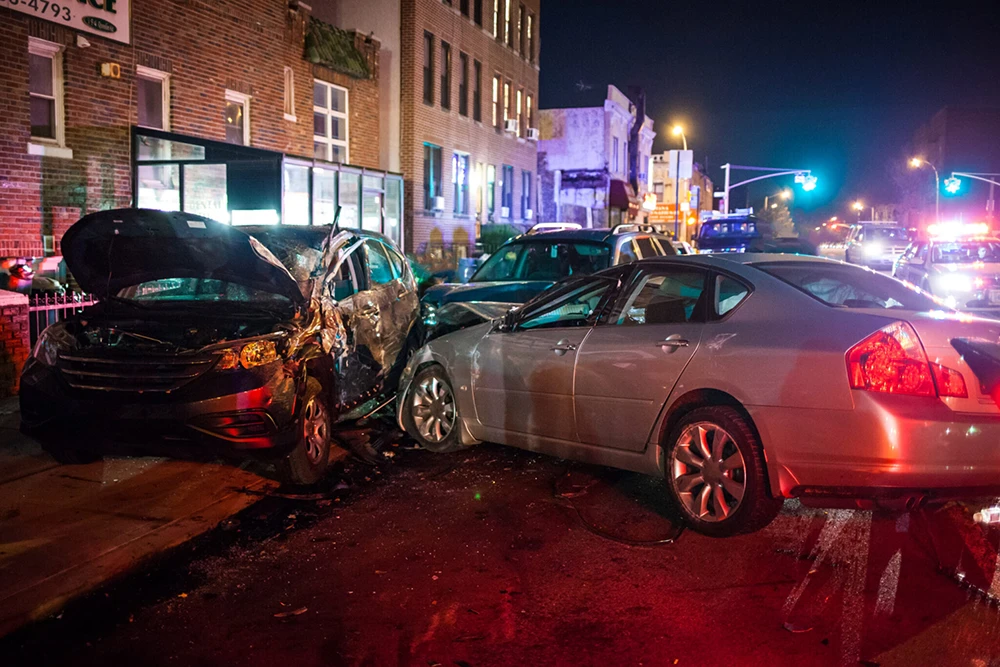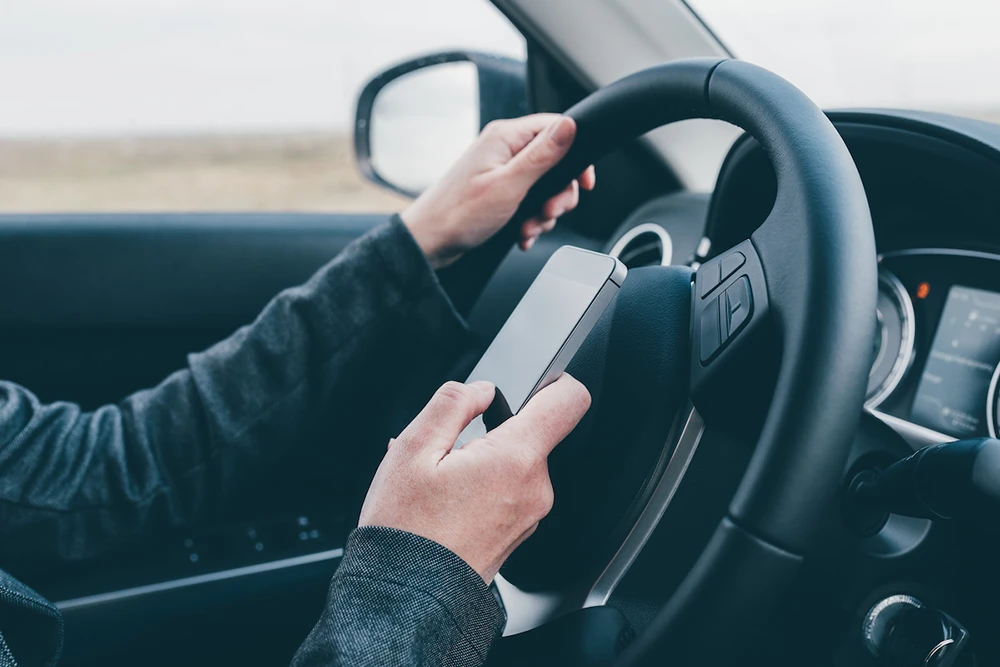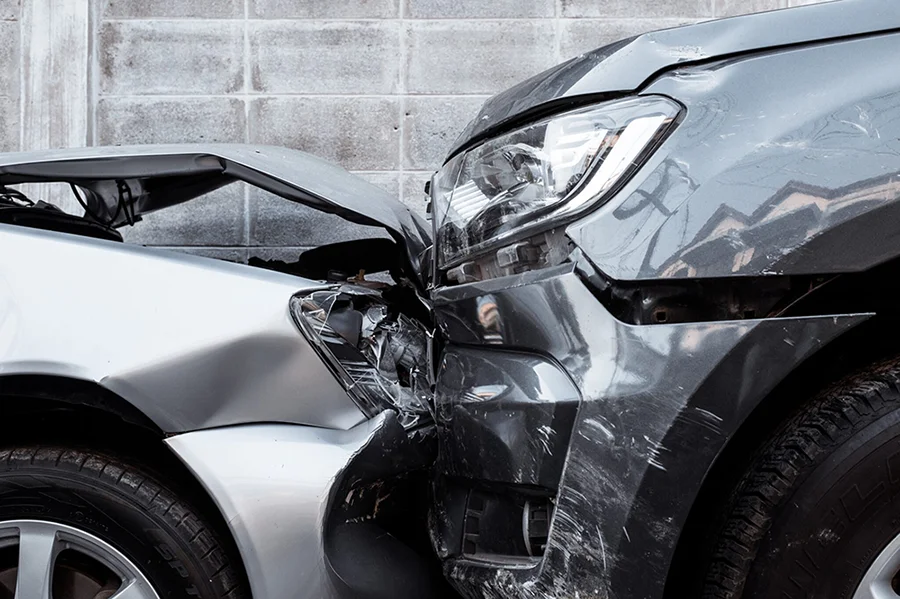
Being involved in a car accident can be overwhelming. However, it’s important to remember the correct things to do after a car accident to ensure your safety, protect your rights, and navigate the complexities of making an insurance claim. Failing to handle the situation properly can have lasting consequences.
In this blog, we’ll walk you through the six essential steps to take immediately following a car accident.
1. Prioritize Safety
Your first priority after a car accident is to ensure the safety of everyone involved. These immediate safety measures will help minimize harm:
- Check for Injuries: If you, your passenger, or the other driver or passengers are injured, call 911 or have someone else do so for you. If anyone appears to have serious injuries, do not move them. Wait for emergency services to arrive to prevent making any injuries worse.
- Move vehicles and people to safety: If the vehicles are safe to drive, pull them over to the side of the road. If a car is immovable, leave it where it’s at and get yourself and your passengers to safety, either far off the side of the road or onto a nearby sidewalk. Do not exit your vehicle or unfasten your seatbelt if you are on the highway.
- Call the police and emergency services: Regardless of the accident’s severity, you should call 911 to at least have police on-site. The officers will be able to document the scene and complete an accident report that will be essential for filing an insurance claim.
- Turn on hazard lights and wait for help: Once in a safe location, shut off your engine and turn on your vehicle’s hazard lights. Place any emergency supplies, like road flares or triangles, around your vehicle, as well, to warn other drivers to slow down around the accident scene.
2. Call the Police and Report the Accident
As stated previously, contacting law enforcement to report the accident is crucial for a thorough documentation process. A police report plays a vital role in insurance claims and helps establish the facts of the accident. When talking with the officers, provide as much accurate information as possible regarding what happened. They will also require documentation, such as insurance information, driver’s license, and vehicle registration. Any office you speak with, be sure also to obtain their contact information if you have follow-up questions or concerns regarding the accident or, in a worst-case scenario, need to report any unfair treatment or mishandling of the accident.
3. Exchange Information with the Other Driver
Collecting essential details from the other driver is also critical for the claims process. When performing this step, it’s absolutely crucial to stay calm and collected and discuss only the necessary details. Here’s what you should expect to exchange:
- Insurance information, including insurance company and policy number
- Full name and contact details
- Vehicle information, such as type, color, and model
- Driver’s license and license plate number
- Accident location

Should I Admit Fault? What Not to Say
When exchanging information, avoid discussing any kind of fault with the other driver. Even if it does seem as though it was your fault, never admit it, as it puts you at risk of not receiving any compensation you may have otherwise been entitled to. Once you file an insurance claim, an adjuster will review the claim to determine fault based on vehicle and property damage inspections, all provided information, and supporting documentation.
To avoid all monetary responsibility from falling onto your insurance, take these steps to avoid accidentally admitting fault in the incident:
- Avoid polite apologies and be honest with responding police officers by providing objective details. Do not lie; simply state the facts of the accident from your perspective.
- Do not talk with insurance adjusters unless you have an attorney present or have consulted with one.
- Don’t talk with the other driver except to exchange necessary information. Do not discuss any accident details with them. If they try, state that you will only discuss details with the authorities.
4. Document the Accident Scene
Trying to remember the small details after an accident can be difficult, especially when you’re asked to recount the event days or even weeks later. Documenting as much information as you can while you’re on the accident scene will help protect yourself and act as a backup to corroborate your side of events. Here’s what to document:
- Responding officers’ information: Once police arrive, take note of their names and badge numbers.
- Get a copy of the accident report: If not offered, ask the police officers where you can obtain a copy of the accident report. Your insurance provider may require a copy when filing an insurance claim.
- Take plenty of pictures: Photographs are valuable evidence in car accident claims as they can help provide context and establish liability. Thoroughly document the accident scene by taking pictures of your vehicle from multiple angles and the damage that occurred to both vehicles. Also, be sure to capture photos of any other property damage, skid marks, surrounding traffic signs, road conditions at the time of the accident, and any visible injuries.
- Write down names: Take down the names and addresses of everyone involved in the accident, including passengers. This can make it easier to contact them should any statements be needed during the claims process. If there are any witnesses to the accident, be sure also to take down their names, statements, and contact information for the same reasons.
5. Seek Medical Attention
Any obvious or potential injuries should receive prompt medical attention, even seemingly minor ones. Neglecting medical care can lead to severe consequences and long-term health effects. If you decline medical attention on the scene, schedule a doctor’s visit immediately for a full exam. Some injury symptoms won’t be present right away, and if you need to file a personal injury case, you will need medical documentation that shows the injury was caused by the accident. Once you visit your doctor, you’ll need to follow any and all advice to prevent damaging your potential case.
What If I Feel Pain After a Car Accident?
Many people involved in car accidents may feel only minor injury symptoms or even no symptoms at all. Unfortunately, adrenaline and other trauma responses can actually mask or delay injury symptoms, causing pain that occurs hours, days, or even weeks after the accident.
Here are possible injuries that can cause delayed symptoms after an accident:
- Back pain: Injuries like whiplash, spinal injury, a herniated disc, sprain, or soft tissue damage to the back can cause back pain. Spinal misalignments can also cause vertebrae to move out of place and put pressure on surrounding nerves, causing nerve pain, numbness, and tingling. Consulting with a doctor can help prevent limited mobility or worsening symptoms.
- Neck pain: Whiplash is the most common cause of neck pain after an accident, as the head is forced backward into the seat. This can lead to stiffness, soreness, limited range of motion, pain, swelling, headaches, and blurred vision. If it is not whiplash, the pain could be the result of a spinal cord injury.
- Headaches: In most cases, headaches aren’t severe and will go away on their own. However, headaches can point to a potentially serious issue, such as a blood clot in the brain, concussion, or injury to the head or neck. Any head injuries resulting from car accidents put you at risk of a traumatic brain injury. If you’ve hit your head in the accident, seek medical attention immediately.
- Abdominal pain: Abdominal pain after an accident could be a sign of internal bleeding, which can be life-threatening. Some individuals may also experience other symptoms, including purple bruising, dizzy spells, or fainting. Any possible symptoms of internal bleeding should be seen by a doctor immediately.
- Numbness or tingling: Whiplash or spinal damage could cause numbness or tingling in your arms and legs. This is due to damage or injury to the nerves that surround your spine. Unfortunately, these issues can persist if left untreated.
- Behavioral changes: Subtle behavioral changes after an accident could be the result of possible brain injury. Concussions can cause personality changes, memory problems, vision or hearing issues, or depression. The sooner you receive a diagnosis, the sooner you can begin recovery and prevent further damage.
6. Report the Accident to Your Insurance Company
It’s important to initiate the claims process promptly and report the accident to your insurance company. There are a few different ways you can go about filing an insurance claim:
- Filing a third-party claim: In simple terms, this is when you make a claim against the other party’s liability insurance for crashing into you. You are the third party to the other driver and their insurance company. Their insurance processes the claim, but it may take some time as they perform their own investigation to determine if their customer was actually at fault.
- Filing a claim in a no-fault state: States with no-fault insurance laws require that you always make injury claims on your own insurance first, even if the other person caused the accident. You can sue the other driver if certain state-defined qualifications are met, which typically includes serious injury or death.
- Using your own insurance due to an underinsured driver: Some drivers won’t have enough insurance coverage or assets to pay for your injuries or damage. In that case, you’ll likely want to use your own underinsured motorist coverage if you have it to cover medical bills when the other party’s insurance is insufficient.
- Using your own collision insurance: Some drivers choose to work with their own company for damage repair rather than dealing with the other person’s insurance company. Collision insurance can be used to cover vehicle damage caused by someone else without having to involve the other party. Unfortunately, this will reduce your collision deductible amount unless your insurance company chooses to go after reimbursement from the other insurer.
Whichever claims process you choose or need to take, be sure you provide all necessary information, such as a police report and the information for the other party.

What Are Tips on Filing an Auto Insurance Claim?
Filing an auto insurance claim can be a complex process, but with the right approach, you can navigate it smoothly and maximize your chances at a fair settlement. Here are some essential tips to help when filing an auto insurance claim:
- Act promptly: Contact your insurance company as soon as possible after the accident. Most insurance policies have a deadline to file claims, and exceeding this timeframe can jeopardize your chances of compensation.
- Provide accurate information: Include the date, time, and location of the accident, as well as the names and contact information of all involved parties. Misinformation or incomplete details may cause delays or lead to complications in the claims process.
- Maintain documentation: As previously stated, thorough documentation is essential. To make the process easier, keep a file with the police report, medical records, repair estimates, and any other relevant documents to strengthen your case and accurately represent the associated costs.
- Follow instructions: Your insurance company will provide specific instructions on how to proceed with the claim. Follow these diligently. Failure to adhere to their guidelines may result in delays or even a denial of your claim.
- Be wary of recorded statements: Insurance adjusters may request recorded statements from you. While it’s essential to cooperate, be cautious about what you say. Stick to the facts and avoid speculations. Statements made in the heat of the moment could be misinterpreted and used against you later. If you’re unsure, it’s best to consult with experienced legal counsel before providing a recorded statement.
- Understand your coverage: Familiarize yourself with the details of your insurance policy. Understand the coverage limits, deductibles, and any exclusions that may apply. Knowing the specifics of your policy will help you manage expectations and make informed decisions during the claims process.
- Consider legal assistance: If your claim encounters challenges or you believe you are not receiving fair treatment, consult with an attorney specializing in personal injury or insurance law. Legal professionals can provide guidance, negotiate on your behalf, and ensure your rights are protected.
Remember, every auto insurance claim is unique. If you encounter difficulties or have specific questions, don’t hesitate to contact your insurance company for clarification or seek legal advice to ensure you receive the compensation you deserve.
Legal Considerations: How Do I Know if I Should File a Lawsuit?
Deciding whether to file a lawsuit after a car accident involves carefully considering various factors. While not every accident necessitates legal action, certain circumstances may warrant pursuing a lawsuit to protect your rights and seek fair compensation. Here are some key considerations to help you determine if filing a lawsuit is the right course of action for you:
- Fault and liability disputes: If there is a dispute over who is at fault for the accident, and the insurance companies involved cannot reach a fair resolution, a lawsuit may become necessary. Legal action can help to establish liability and ensure a just determination of fault.
- Serious injuries or long-term consequences: Consider filing a lawsuit if you or other parties involved in the accident have sustained serious injuries with potential long-term consequences. This may include permanent disabilities, chronic pain, or extensive medical treatments. Legal action can help secure compensation for current and future medical expenses.
- Insurance coverage limitations: In some cases, insurance coverage may be insufficient to cover the full extent of damages. If the at-fault party’s insurance policy has low limits or you’ve exhausted your own policy, filing a lawsuit may be the only way to pursue additional compensation.
- Uninsured or underinsured motorists: If the at-fault party is uninsured or underinsured, and you have uninsured/underinsured motorist coverage, a lawsuit against your insurance company may be necessary to access the compensation you deserve.
- Loss of income and future earnings: If the accident has resulted in a significant loss of income or potential future earnings due to injuries, a lawsuit can help recover these economic damages. This is especially crucial if the at-fault party’s insurance is unwilling to adequately compensate for these losses.
- Emotional distress and pain and suffering: Emotional distress, pain, and suffering are subjective damages that an insurance settlement may not fully address. If you’ve experienced significant emotional trauma or ongoing pain and suffering, a lawsuit may be necessary to seek appropriate compensation.
- Wrongful death claims: In the tragic event of a wrongful death resulting from a car accident, filing a lawsuit may be the only way to hold the responsible party accountable and secure compensation for the surviving family members.
- Statute of limitations: Remember the statute of limitations, which is the time limit within which you must file a lawsuit. Missing this deadline could result in losing your right to pursue legal action. Consult with an attorney promptly to ensure you adhere to the applicable timeframe.
Filing a lawsuit is a significant decision, and weighing these considerations carefully is essential. If you’re uncertain about the viability of a lawsuit in your case, seeking legal advice from a qualified personal injury attorney can provide clarity and help you make informed decisions regarding your claim.
Get the Help You Need After a Car Accident with Simon Law
After a car accident, seeking experienced legal consultation is crucial. At Simon Law, our team of experienced personal injury attorneys will pursue the compensation you are entitled to. Take the first step toward a comprehensive resolution – contact the Simon Law Firm today.


